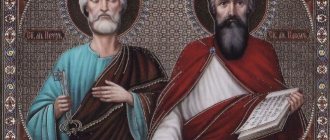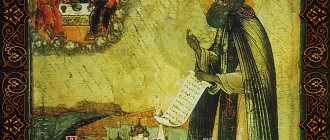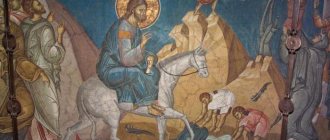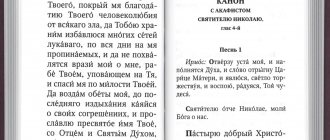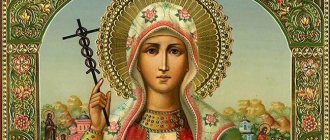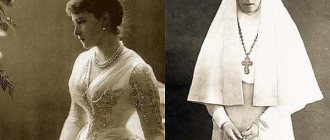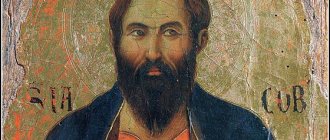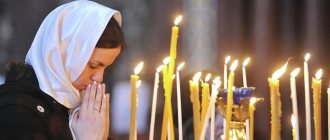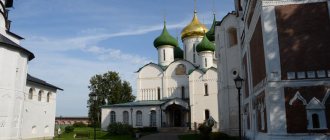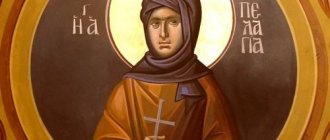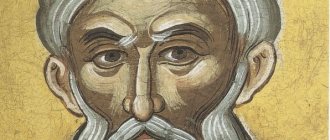Life of the Holy Apostle Barnabas
The saint was born in Cyprus. Received the Hebrew name Joseph. This is what his parents, rich nobles, named their son. Barnabas was educated at the prestigious Jerusalem School. He learned to read and write with Saul, who would later become the Apostle Paul.
Barnabas had a chance to see Jesus of Nazareth with his own eyes. He immediately believed his teaching, became a follower of Jesus, and was inflamed with special reverent love for him. The Lord himself chose him and placed him among the seventy disciples, which is why Barnabas is often called the apostle of 70. Joseph received the name “Barnabas.” In Hebrew this name means "Son of Comfort." After the Lord ascended to heaven, he sold his lands, which belonged to him by inheritance rights, and brought money to the apostles.
According to the Gospel, you can trace the actions and movements of Barnabas. It is known that the Apostle Paul, being Saul in the world, heard the voice of God before arriving in Damascus and converted to the Christian faith of Jesus. Saul appeared to the apostles, but they did not accept him, then Barnabas stood up for the future father of Christian theology, Paul, and became his intercessor before his brothers.
Barnabas himself, after hearing the Lord, immediately began to help him spread the teaching among pagans or unbelievers, asking the Orthodox to believe in Christ with all their hearts sincerely.
After King Herod imprisoned Peter, Barnabas and Paul escaped from prison. Then they hid from their pursuers in order to leave Seleucia to preach the word of God.
The Jews expelled Paul and Barnabas. Finally, in Iconium they managed to heal a man and bring the people to their side. But the inhabitants wanted to regard them as gods in order to worship them. Paul and Barnabas were indignant, and therefore were forced to leave this city.
Finally, the disciples of Christ were divided. Barnabas continued to convert Cypriots to Christianity, then went to Rome.
Researchers believe that he may have been the first preacher to proclaim Jesus Christ in Rome.
Then Barnabas returned to Cyprus and continued to spread the teachings of Jesus. The Jews of Cyprus turned the pagans against the apostle. The pagans stoned the saint and lit a fire to burn him. Barnabas' lifeless body was thrown into the fire. But his body remained untouched. Mark, a disciple of the apostles from the 70th, returned for the body, took it and buried it in a cave. He placed the Gospel of Matthew on his chest. Barnabas himself ordered this.
Proceedings
In the 5th century, a false description of his wanderings appeared, from which it follows that Barnabas preached Christianity on his native island, where he was stoned by the Jews.
Gospel of Barnabas
Another forged text, the so-called “Gospel of Barnabas,” appeared in the Middle Ages; he describes the gospel events from a Muslim perspective.
Message of Barnabas
A special message is attributed to him, the Greek text of which was discovered by Tischendorff in the Codex Sinaiticus, previously known only from a poorly preserved Latin translation. Most likely it was written ca. 130 in Alexandria and was highly respected among early Egyptian Christians (such as Clement of Alexandria).
The Epistle of Barnabas treats the attitude of Christians to the Old Testament. The author has an extremely negative attitude towards Jews, believing that for them the Old Testament is a closed book, and only those who look for hints in the text regarding the appearance of Christ can understand it.
Relics and veneration
It is known that Barnabas died when he was 76 years old. Over time, the cave where he was buried was forgotten. But miraculous signs constantly pointed to the burial place. For example, under Emperor Zeno, Barnabas was revealed to Archbishop Anthimus three times, thereby he himself pointed to the place of burial. Monks sent by the clergyman dug up the untouched body of the apostle with the Holy Gospel on his chest.
After the relics were found, the Church of Cyprus gained the right to elect its own abbot. This protected the island of Cyprus from the claims of the Ecumenical Council, which was headed by the heretic Peter Cantheus.
Prayers are dedicated to His Holiness Barnabas.
Kontakion 1
We praise you with love, the chosen saint of Christ and the wonderful wonderworker, the great teacher of the ascetics of the Russian land and our intercessor, Reverend Father Barnavo. But you, who have great boldness towards the Lord, free us from all troubles with your prayers, and let us call to you: Rejoice, Venerable Barnabas of Gethsemane, God-wise and glorious miracle-working shepherd.
Ikos 1
The Creator of angels and Creator of all creation, the Lord, having foreseen your life as equal to the angels, O Reverend, from your youth chose you to serve Him in reverence and truth, and see to adorn you with many heavenly gifts: drive away demons, heal ailments, comfort the afflicted, soften hardened hearts. Also from us, unworthy, receive praise and make a prayer for the salvation of the souls of all who honor your memory with love, may we magnify you:
Rejoice, living for the glory of God; Rejoice, illuminated by the grace of the Holy Spirit. Rejoice, thou who countest earthly vanity for nothing; Rejoice, beloved heavenly treasure. Rejoice, zealot of the exploits of the venerable fathers; Rejoice, spiritual successor of the wondrous elders and mentors. Rejoice, kind and long-suffering shepherd; Rejoice, diligent worker of Christ’s grapes. Rejoice, thou blessed with the gift of miracles; Rejoice, wonderful imitator of the life of the angels. Rejoice, O God-given prayer book for the whole Russian land; Rejoice, thou crowned with the crown of glory from the Lord.
Rejoice, Venerable Barnabas of Gethsemane, God-wise and glorious miracle-working shepherd.
Kontakion 2
Seeing the Lord, your soul was prepared to receive the grace of the Holy Spirit, as if you were following the path of piety by your will, in which you were instructed by your Christ-loving parents, who from your youth kept you in illness and adversity. From your small years you glorified the All-Bounteous God, the Physician of souls and bodies, singing to Him the song: Alleluia.
Ikos 2
Having a mind illuminated by the grace of God from youth, you came, Reverend Father, to the elder Gerontius, so that he would direct you to the path of true life and bless you for spiritual deeds. You found in him the monastic work of a good mentor, obeying his fatherly advice and putting aside all worldly cares, you learned prayer and humility. Moreover, honoring your memory, we call you this:
Rejoice, God-given consolation to the parents of the pious Elijah and Daria; Rejoice, you who were well brought up by them in the faith and passion of God. Rejoice, wonderfully preserved from death by the power of God; Rejoice, you who have been drunk from childhood with the teachings of piety. Rejoice, loving the Lord with all your heart; Rejoice, having tasted the sweetness of prayer from a young age. Rejoice, you who direct your soul towards God; Rejoice, having acquired Christian virtues from your youth. Rejoice, adorned with faith, hope and love from childhood; Rejoice, you who have received the good yoke of Christ upon yourself. Rejoice, for through obedience to the elder you cultivated humility in yourself; Rejoice, for from your youth you prepared yourself for monasticism.
Rejoice, Venerable Barnabas of Gethsemane, God-wise and glorious miracle-working shepherd.
Kontakion 3
The power of God strengthened you, reverend father, when you followed the advice of Elder Gerontius, you left your fatherland and home and moved into the monastery of the Trinity-Sergius, where you continued in fasting, prayer, tireless work and vigil and conquered all temptations of the world, singing to the only God : Hallelujah.
Ikos 3
Have the elders-mentors of the godly wise Gregory and Daniel, you received the prophecy from them, reverend, as you will guide many to salvation. You served faithfully as your mentor until their very death, patiently pursuing an ascetic life and ascending from strength to strength. Likewise, we, marveling at your faithfulness and obedience as an elder, cry out to you like this:
Rejoice, filled with Divine zeal; Rejoice, despising the vanity of this world and all its blessings. Rejoice, for you have loved purity and silence from your youth; Rejoice, for from the years of adolescence you desired the monastic life. Rejoice, for the sake of love for the Lord you left your father’s house; Rejoice, you who have taken up residence in the Lavra of St. Sergius. Rejoice, having preserved obedience to your elder and in the monastery; Rejoice, faithful executor of your blessings. Rejoice, you who imitated the ascetic elder Gregory and Daniel in their labors; Rejoice, having served them well until their blessed death. Rejoice, having subdued your flesh through fasting and abstinence; Rejoice, having prepared your heart for the abode of the Holy Spirit.
Rejoice, Venerable Barnabas of Gethsemane, God-wise and glorious miracle-working shepherd.
Kontakion 4
Avoiding the storm of temptation from the more crowded monastery, you moved into the monastery of Gethsemane, O Reverend Father, desiring to spend your life in silence and converse with God freely, offering prayers for all people to the Savior of the world and singing to Him the song: Alleluia.
Ikos 4
Hearing about your godly life, reverend, those who came to you from all ends of the Russian land, near and far, and you accepted them with love, guided you to salvation. In the same way, your elder schemamonk Gregory handed you two prosphoras, saying: hereby feed the hungry - with words and bread, as God wants, and bless you for the feat of eldership and priesthood. We, glorifying the Lord who strengthened you, joyfully cry out to you:
Rejoice, called by God to a holy monastery; Rejoice, you have received the blessing of the elders on your monastic path. Rejoice, image of true obedience; Rejoice, decoration of the monks of the monastery of St. Sergius. Rejoice, lover of vigil and prayer; Rejoice, having cleansed yourself from passions through exploits. Rejoice, having astonished everyone with meekness and humility; Rejoice, immaculate worker of Christ’s commandments. Rejoice, you who diligently served those who want salvation; Rejoice, for you received those who came to you with love. Rejoice, good helper to those seeking spiritual salvation; Rejoice, for you have led many to a truer faith.
Rejoice, Venerable Barnabas of Gethsemane, God-wise and glorious miracle-working shepherd.
Kontakion 5
You, the servant of God, were like a God-flowing star with rays of grace illuminating the people of Russia, when you were honored with the image of monasticism and the priesthood, and from that hour you led many to the Sun of Truth, Christ, with the word of grace and the example of your life, which was all devoted to the service of God and your neighbors. And just as people saw you at the throne of the temple of God, praying for everyone and everything to the Savior of the world, now offer up your prayers for the Church of the Saints, our Fatherland and for all who honor you and sing to God: Alleluia.
Icons and frescoes of the monastery
Today the monastery houses an interesting museum of icons and archeology. One of the surviving frescoes from the 12th century is called “Pantocrator” - Christ Pantocrator. It is believed that it was made by a Byzantine master who painted the Church of Asizu in Sicily.
Other frescoes depict the following scenes: how Archbishop Anthimus opens the crypt, and then transfers the discovered Gospel to the Byzantine emperor; how Zeno presents imperial gifts to the archbishop for a valuable find. Most of the 15th century paintings were made in the Franco-Byzantine style.
The icons in the monastery date back to the 18th–19th centuries; their authors are the monks living here. Therefore, various scenes related to the construction of the monastery are depicted here.
The historical museum of the monastery displays archaeological finds: antique ceramics, Roman glassware and ancient jewelry. It will be interesting to visit a carpet workshop with products by local authors.
© rolf frische luft
